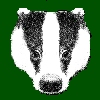Science aligns against Welsh badger cull

13 July 2010 - BBC News
By Richard Black Environment correspondent for BBC News
Badgerland say: Please read Richard
Black's full article on the link at the bottom of this page:
The Badger Trust appealed against the Welsh badger cull on three grounds:
- the WAG did not expect the cull to generate a
"substantial" reduction in TB incidence, which is required in law
- it had failed to balance concern for badgers and nature against the
projected benefit to farmers
- its control order covered the whole of Wales, but should have been
directed only to the North Pembrokeshire target zone.
On the first point, two of the three judges agreed with the
Badger Trust that
the badger cull was not expected to make a substantial reduction in bovine TB in
cattle
On the second point, two of the three judges also agreed that it failed to
balance the immense harm done to badgers against the very limited benefit to
cattle.
On the third point, all three judges were unanimous - the WAG
was in error. Minister Jones knew this already as she was preparing to launch an amended control order within days.
Essentially though, the key thing that came to light is that badger culling would not make a substantial
cut in the incidence of bovine TB. The Randomised Badger Culling Trial
(RBCT, also known as the Krebs trial) - saw 11,000 badgers
killed to find out whether culling can be an effective control
strategy. This showed that:
- Killing badgers when there was a TB outbreak made things
worse.
- Wiping badgers out from areas irrespective of TB
incidence made things better inside the cull zone, but worse in a ring outside
it.
- Overall, this means you could can expect a 9% reduction in bovine TB in
cattle by killing all the badgers across a wide area.
Importantly how long does a 9% reduction last once the badger killing has
stopped. Follow-up research on the Krebs sites is still going on, but, as the years go by, you might expect the effects to subside.
In other words, the evidence for a sustained effect of culling is likely to
weaken. And TB rates in Pembrokeshire would also be expected to fall as enhanced
biosecurity on farms and additional testing takes place.
Vaccinating badgers also becomes a better prospect, with trials
underway in the Irish Republic and poised to begin in England.
It is an open secret that silent (and illegal) killing of badgers goes on,
and not just in Wales. But
scientifically, it is just about the worst thing a farmer could do. "The science says it'll make the problem worse," says Dr Rosie Woodroffe, one
of the scientists on the Krebs trial who is now based at the Zoological Society
of London. "Small-scale illegal killing will work like reactive culling and will
increase the incidence of cattle TB, as it disrupts badgers' social structure,
making them range further afield and transmit the bacterium to more badgers and
more cattle."
For more information, please click the following link:
| External News |
|
We have provided links to stories from external news
organisations so you can follow the media interest in badgers, and see who
writes on the subject. We do not endorse external authors. |
 |
|
